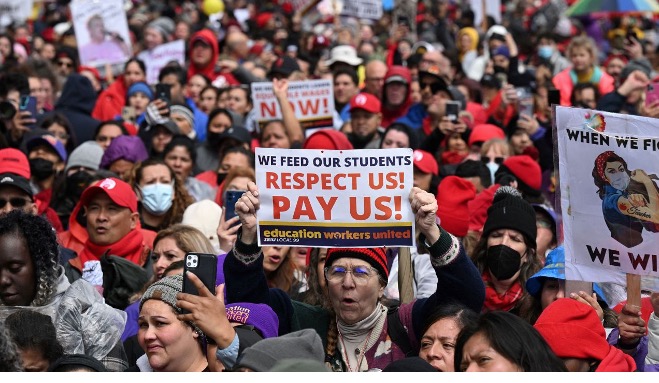Comments
GUEST COMMENTARY - Forty minutes can be a long time.
It’s Friday afternoon and I receive a substitution summons to cover the last class of the day. It’s a Special Education class, and the rules say there must be a certificated teacher there.
Teaching SpEd classes is often complicated and demanding, and it requires special training. I’m about as qualified to teach SpEd as I am to teach ballet.
Fortunately, there is a SpEd teacher's assistant there to assist. She knows her craft and she knows the kids--who has emotional or self-control issues, who needs a gentle touch, who needs to be pushed--and she helps me with the kids.
Then…she leaves!
After only 18 minutes, I’m left to stumble through a long, long 40 minutes.
Why would critical staff we rely on be taken away at such an inopportune moment?
The Los Angeles Unified School District keeps these paraprofessionals at only six hours a day so they won’t be considered fulltime employees, and thus the District can adjust their schedules or reduce their hours whenever they want.
This petty chiseling at the expense of our students and their education is typical of the way LAUSD treats its 25,000 Service Employees International Union employees.
One of the paraprofessionals we depend on at James Monroe High School has been a special education assistant for 23 years and at the top of her pay scale for 17 years. She makes $25.76 an hour for a six hour workday.
She tries to work during the summers, but positions are limited. In one of the most expensive cities in the world, she earns under $30,000 a year.
Many SEIU Local 99 workers make even less. For example, cafeteria workers make $16.91 an hour, as do 21 other categories of LAUSD employees.
This week SEIU launched a three-day "Unfair Practice Charge" strike based on its well-founded accusations that LAUSD's mistreatment of SEIU workers violates California labor law. United Teachers Los Angeles decided to honor SEIU's picket lines.
As LAUSD Superintendent Alberto Carvalho faces this strike, he portrays himself as indignant and aggrieved. Don’t buy it—SEIU has long protested these labor law violations, and has been working without a contract since 2020. During years of negotiations LAUSD has offered little, and even today only offers SEIU workers a wage increase well below the rate of inflation--a de facto pay cut.
UTLA educators understand what SEIU faces, as classroom teachers and counselors have worked all school year without a contract. Over the past 10 months Carvalho has spent most of the weekly bargaining sessions with UTLA wasting our negotiators’ time by stonewalling.
While our sympathy strike (aka “solidarity strike”) is being portrayed as a surprise which has blindsided the district, what we’re doing is very much in line with the traditions of American labor. American labor unions were built through labor solidarity, and in recent decades unions have been undermined by the lack of it.
The 1947 Taft–Hartley Act, arguably America’s most important labor law, specifically targets sympathy strikes. President Harry Truman denounced the bill and vetoed it, but Congress, concerned about the post-war strike wave, overrode his veto. The 1959 Landrum-Griffin Act further tightened restrictions.
Polls show LAUSD parents support educators. For example, a Loyola Marymount University poll taken earlier this year asked “LAUSD teachers requested an increase in salary. If labor negotiations cannot reach an agreement, would you support or oppose LAUSD teachers going on strike to meet their demands?”
Among those living within LAUSD’s boundaries, 76% supported teachers.
Interestingly, among those aged 18-29--people who most likely attended LAUSD schools not long ago--88% supported teachers.
By contrast, when the poll asked respondents how they’d grade Carvalho, his “grades” amounted to a 2.3 GPA.
Over half of LAUSD’s SEIU workers have children in LAUSD. Moreover, many of our students have aunts, uncles, grandparents, and older siblings who work at LAUSD.
There is only one way for UTLA educators to keep faith with our students, their families, and the workers whose labor enables us to educate our students--by honoring SEIU’s picket lines.
###
(Glenn Sacks teaches social studies and represents United Teachers Los Angeles at James Monroe High School in the Los Angeles Unified School District. His columns on education have been published in dozens of America's largest publications.)






